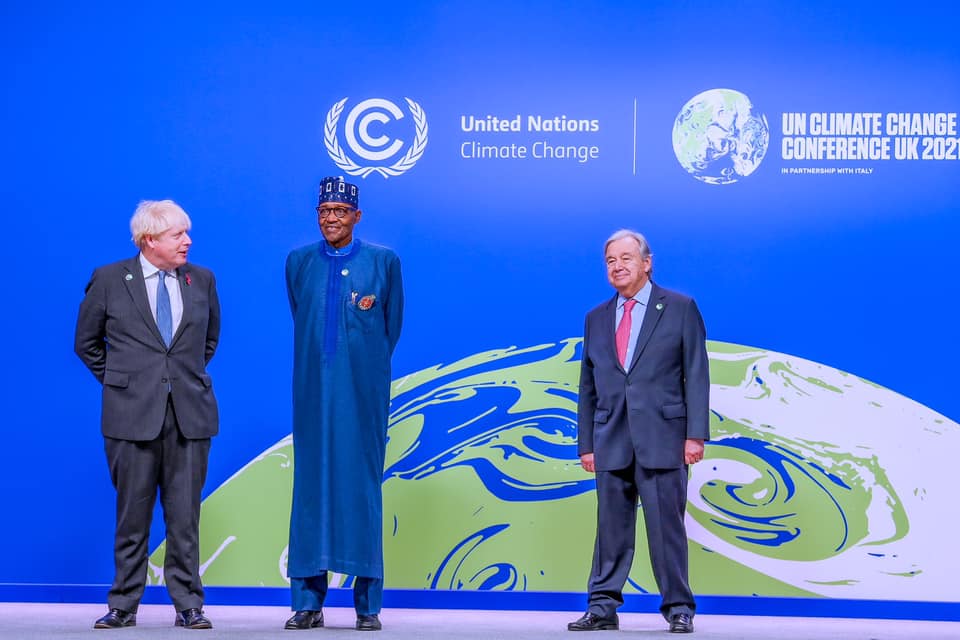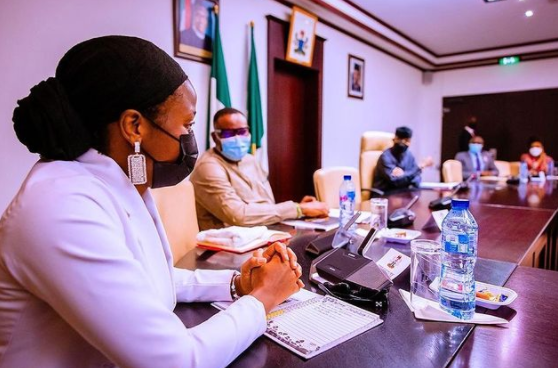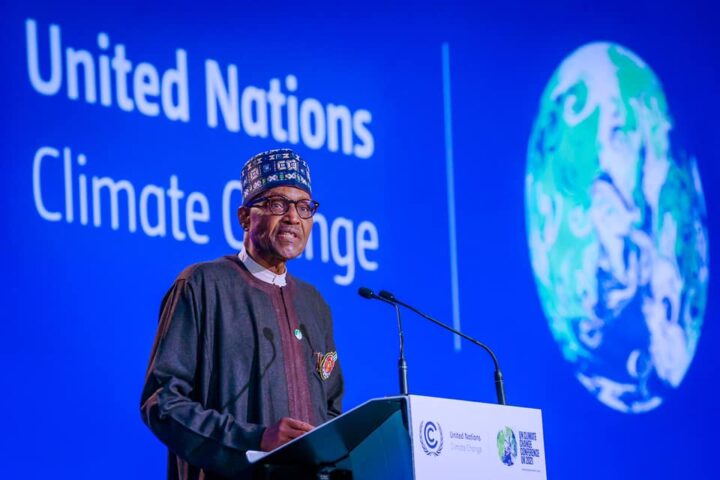Elementary leadership lesson highlights that today’s decisions shape tomorrow’s future. It is only those meant for the destruction that will not pay heed to this all-time truth. This aphorism aptly captures the mood of the country as the world gathered recently in Glasgow, Scotland, to discuss climate change and the future – a future that depends directly on activities within and outside the frontiers of our immediate ecosystem and biosystem.
We witness climatic chaos that impacts different parts of the world irrespective of who was most culpable in emitting the greenhouse gas or more carbon compliant. Nature sees the globe as one; hence the impact of pollution and carbon dioxide in faraway Asia may have a devastating effect in Africa and vice versa.
It is a fact that climate change is impacting communities in every country in different dimensions. It causes rising sea levels, coastal erosion, extreme weather events, disrupted economies, food and water scarcity, insecurity because of resource scarcity, and conflict and terrorism. These are all manifestations of this global challenge. Undoubtedly, the world needs urgent action, new partnerships, and ambitious ideas to tackle this challenge. Any meaningful solution must be international in approach. Little wonder global leaders gathered in Glasgow to negotiate and strategise on how to achieve net-zero emission soon.
In the imaginary hall in Glasgow, there were four classes of countries represented. The first is the developed countries, the post-industrial economies, who are entitled to be preaching the gospel of net zero-emission, and 1.5C temperature goals. The second group of nations are those who were in Glasgow for showmanship to register their presence. The third group of countries are those whose national economic interests will be impacted by the actions or inactions of post-industrial economies in pursuit of climate change objectives. The fourth group are those who, in pursuit of their national economic interest, are resisting the mitigation measures prescribed by the West against the harmful effect of climate change or are unenthusiastic about the narrow Western definition of climate change mitigation.
Advertisement
Based on signals coming from Abuja, Nigeria seems to belong to the third group. It runs a mono-product economy heavily dependent on fossil fuel and rent-seeking on other natural resources, which the world is clamouring to reduce or eliminate in favour of clean and renewable energy sources. It may be counterintuitive for Nigeria to champion 1.5C and zero-emission goals, given that it may not be in its national interest, at least in the interim. The importance of national interest and the various divergent positions of different countries in the discussions at Glasgow shows the contradictions and conundrums the world faces in dealing with carbon emission and energy production issues, which is why COP26 could not arrive at a consensus on crucial issues.
The post-industrial nations took the position of an immediate and severe shift in energy production and usage from carbon to renewable and clean. This position is understandable because these nations historically used carbon energy to fuel their industrialisation and have mostly moved to a knowledge economy and have the financial and technological muscle to champion green energy and the economic opportunities therein. The new emerging energy giants (Kuwait, Qatar, UAE, and Saudi Arabia) have a different position which primarily is a call to be given more time to power a new economic renaissance based on exploiting carbon energy and using it to transition into a knowledge economy less reliant on carbon energy and more reliant on technology and innovation.
The developing countries that are heavily reliant on carbon fuel for primary substances have a different position altogether. Although not wholly condemning a shift from carbon to clean energy sources, we are calling for the developed countries to assist them to make such a transition. President Buhari, in his speech at the conference, emphasised this position. He pledged that Nigeria would cut its emissions to net-zero by 2060 but argued, however, that “attaining national and global climate change goals will require adequate and sustained technical and financial support to developing countries. And that developed countries should channel greater effort towards assisting developing nations to meet their “Nationally Determined Contributions (NDCs) commitments through the pledges made by the developed countries to provide at least $100 billion yearly.” China and Russia seem not enthusiastic about climate change and are struggling to lead in these discussions and participate actively.
Advertisement
Leaders from developed economies have made various pledges to show their commitment to achieving the 1.5C temperature goal, and they are calling on other leaders to work together to accelerate the innovation and deployment of clean technologies needed to keep the 1.5°C goals within reach so that they are accessible and affordable for all. Most of the leaders set out the ambitious actions they are taking domestically and internationally and send a clear message to all stakeholders to accelerate urgent action this decade. They set out a positive vision for a clean, green future and its benefits, including creating new jobs and global growth. However, where does it leave developing countries, especially in Africa? What is Nigeria’s national interest in switching to carbon-free, renewable, and clean energy forms given our abundance of fossil fuel and gas deposits and our reliance on them for national development?
The case of developing countries is unique. Africa claims that it is contributing less to carbon emission in the world given its low
level of industrial activities. But Africa presents an even more unique stance. Africa has a net disadvantage in climate change because it suffers more than it contributes to the problem. Compared with developed countries, the whole of Africa does not emit as much greenhouse as some major industrial countries or industrial blocs of the world. Therefore, African countries must articulate a better strategy in dealing with the global issue of climate change and greenhouse emissions that will help it grow and not be disadvantageous in the long run.
Therefore, I propose the following: First, African countries will mostly need to continue exploiting fossil fuel for consumption and sales to grow their economies into industrialised or knowledge economies. Any power bloc should not harangue Africa to take actions detrimental to its growth. They should avoid any quick and dangerous shift to cleaner energy unless the structures and systems that will facilitate such transition smoothly are in place. The consequences of a wrong move may be dire and catastrophic given the poor state of the African economy now hugely dependent on carbon energy. Proper research and planning are needed to understand and articulate a more robust approach to such a transition that will have little or no consequences to our economy and way of life.
Second, for African economies to leapfrog to carbon neutrality and zero-emission effectively, they will need new technologies, know-how, and economic imperatives to make such a move. Therefore, Africa should be demanding technological transfer in green, clean, and renewable energy as part of these negotiations. The developed countries must be ready to provide that. They must not be preaching to Africa to take a leap of faith and transit to carbon-free energy whilst hiding the technology and milking Africa from using such technology. It will be tantamount to a double standard. It is like asking someone to do deep-sea diving he does not need, only to come back to ask him to buy swimming gadgets at an exorbitant price from you.
Advertisement
Third, commensurate incentives for investment in a carbon-neutral economy for African economies need to compensate for the loss of investment in fossil fuels. If the developed economies want to save the planet for future generations, they may need to pay the bill for leapfrogging African economies to carbon neutrality. It is noteworthy that $100b has been earmarked yearly to facilitate the achievement of the 1.5C goal. This action is commendable, but this amount is a drop in the ocean compared to what is needed to make the transition easier for Africa. There is a need to continuously increase the funds and get nations that contribute to more CO2 emissions to pay more.
Finally, Africa must be made to benefit extensively from the economic opportunities inherent in the transition to clean and renewable energy. Future economies will be built on new energy forms. The way we live our lives will change forever. New jobs, new ideas, new ways of working, new gadgets and technologies will come up. Renewable energy technology may not completely replace carbon energy and its technology. They are more likely to coexist together with carbon energy technology and usage reduced to the barest minimum. Africa must be positioned to benefit from the energy mix of the future and not play catch up to the rest of the world.
However, Nigeria needs to adequately articulate its national interest and modus operandi in engaging with the rest of the world in
renewable energy, climate change and their economic implications. In his speech at COP26, President Buhari hinted at the broader scope of Nigeria’s stance and approach in dealing with these issues. I commend him for such leadership in such an important issue. His pledge of net-zero carbon emission by 2060 gave Nigeria a 40-year gap to plan and put its acts together. Therefore, Nigeria can strategise to increase exploration and exploitation of fossil fuel in the short run to position itself economically to cut down carbon emission and dependence on fossil fuel at the appropriate time. Recently, Nigeria has been preoccupied with preventing millions of its citizens struggling with the rising cost of petrol and gas from not resorting to charcoal and firewood, which means fewer trees, deforestation and more carbon offloading. It shows that Nigeria is not ready yet to deal aggressively with clean energy and climate change issues.
Nigeria and the rest of the world are on different pages at COP26. The next ten years will be critical for Nigeria as the world increases its pace towards clean energy. The world is pushing towards zero-emission while Nigeria is still battling to decide on what to do with gas flaring and gas resources generally. The world is creating a new model of economic prosperity, but Nigeria has not even optimised the old model much more, positioning itself to benefit from the recent economic model. It is time we got ready to face the future. The decisions we make today will shape tomorrow and the future.
Advertisement
I implore the government to take the issues of energy transition and the concomitant implications seriously. I call on the government and research institutes to invest in research in this area focussing on Nigeria and how it must navigate the turbulent waters of global energy shift from carbon to clean energy. Products of the study should guide the government in its plans and policies in this regard. I will suggest the government sets up a think tank of appropriate professionals to keep abreast of developments in this critical energy area and advise the government accordingly.
We need a cross-ministerial collaboration among the relevant ministries and Industry to start working at coming up with ways of achieving the 2060 net-zero carbon emission pledged by the president and put Nigeria in a position to benefit fully from the new global energy economy devoid of carbon emission and delivers for the climate and the people, economic development, and biodiversity. The crux of Nigeria national interest in this energy issue is to work collaboratively with others in the comity of nations to keep the 1.5°C temperature and carbon emission goals in sight whilst supporting sustainable livelihoods and meeting shared promises on adaptation and finance of its people and economy.
Advertisement
Views expressed by contributors are strictly personal and not of TheCable.
Add a comment







